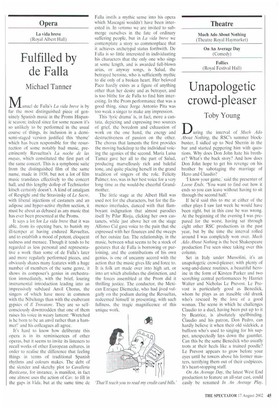Opera
La vida breve (Royal Albert Hall)
Fulfilled by de Falla
Michael Tanner
Manuel de Falla's La vida breve is by far the most distinguished piece of genuinely Spanish music in the Proms Hispanic season; indeed since for some reason it's so unlikely to be performed in the usual course of things, its inclusion in a demisemi-staged version justified this 'theme' which has been responsible for the resurrection of some notably bad music, preeminently Revueltas's La noche de las mayas. which constituted the first part of the same concert. This is a symphonic suite from the distinguished film of the same name, made in 1938, but not a lot of film music translates effectively to the concert hall, and this lengthy dollop of Technicolor kitsch certainly doesn't. A kind of amalgam of Respighi and the Stravinsky of Le Sacre, with liberal injections of castanets and an adipose and hyper-active rhythm section, it must be about as debased as any music that has ever been presented at the Proms.
It says a lot for La vida breve that it was able, from its opening bars, to banish my ill-temper at having endured Revueltas, and to establish a mood of potent, eloquent sadness and menace. Though it tends to be regarded as less personal and representative a work than some of de Falla's later and more regularly performed pieces, and obviously shares many features with a huge number of members of the same genre, it shows its composer's genius in orchestration immediately, with the brief, louring instrumental introduction leading into an impressively subdued Anvil Chorus, the singers of which have more in common with the Nibelungs than with the exuberant gypsies of /1 Trovatore. They are so selfconsciously downtrodden that one of them raises his voice in weary lament: 'Wretched is he born to be an anvil rather than a hammer!' and his colleagues all agree.
It's hard to know how deliberate this opera is in its reminiscences of other operas, but it seems to invite its listeners to recall works of other European cultures, in order to realise the difference that feeling things in terms of traditional Spanish rhythms and colours makes. The debt of the slender and sketchy plot to CavaBerta Rusticana, for instance, is manifest, in fact one almost uses the action of Cav, to fill in the gaps in Vida, but at the same time de Falla instils a mythic sense into his opera which Mascagni wouldn't have been interested in. In verismo we are invited to submerge ourselves in the fate of ordinary suffering people, but in La vida breve we contemplate a story so commonplace that it achieves archetypal status forthwith. De Falla is so little interested in individuating his characters that the only one who sings at some length, and is awarded full-blown arias, or anyway songs, is Salud, the betrayed heroine, who is sufficiently mythic to die only of a broken heart. Her beloved Paco hardly exists as a figure of anything other than her desire and as betrayer, and is too blithe for de Falla to find him interesting. In the Prom performance that was a good thing, since Jorge Antonio Pita was too weak a singer to make any impression.
This 'lyric drama' is, in fact, more a cantata, depicting and expressing two sources of grief, the boredom and exhaustion of work on the one hand, the energy and destructiveness of passion on the other. The chorus that laments the first provides the moving backdrop to the individual voicing the agonies of the second. Maria Luisa Tamez gave her all to the part of Salud, producing marvellously rich and baleful tone, and quite placing herself in the grand tradition of singers of the role. Felicity Palmer, too, was in her best voice for a very long time as the would-be cheerful Grandmother.
The little stage at the Albert Hall was used not for the characters, but for the flamenco interludes, danced with that flamboyant indignation that almost parodies itself by Pilar Rioja, clicking her own castanets, while just above her on the stage Alfonso Cid gave voice to the pain that she expressed with her flounces and the sweeps of her outsize fan. The relationship, in the music, between what seems to be a stock of gestures that de Falla is borrowing or purloining, and the contributions of his own genius, is one of uncanny accord with the action that the music gives life and force to. It is folk art made over into high art, or into art which abolishes the distinction, and the forces assembled at the Prom did it thrilling justice. The conductor, the Mexican Enrique Diernecke, who had jived vulgarly on the podium during the Revueltas, redeemed himself in presenting, with such fullness, the tragic magnificence of this unique work.






























































 Previous page
Previous page